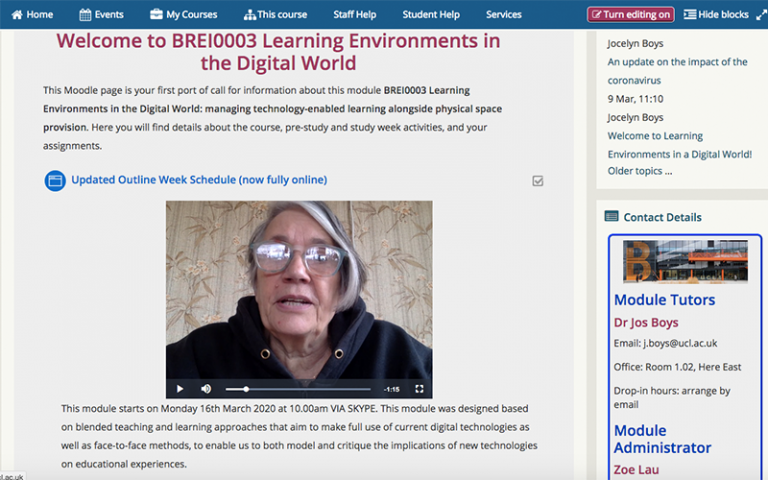Learning Environments in a time of coronavirus
24 March 2020
One of the immediate effects of the coronavirus on education is the sudden and wholesale shift to attempting to teach fully online.

So it was somehow very appropriate to be teaching an MSc module called Learning Environments in a Digital World as an intensive block study week, just as UCL (and many universities across the world) were making the decision to cancel face-to-face classes and offer learning by virtual means instead.
This module was already deliberately designed as blended learning; mixing a variety of teaching and learning methods to underpin - through practice and experimentation - explicit discussion about both the challenges and opportunities of digital technologies for education, and the implications for built spaces. In the new and unexpected world we suddenly found ourselves in, what had to be left out of the mix were the experiential elements - the visits to real learning spaces, the richness of face-to-face engagement with industry experts, and even the embodied, but also digital, experiences of augmented and immersive realities. In exchange we enjoyed many vital discussions with others via the web, and collaborated on learning activities remotely both synchronously and asynchronously.
For universities, having to implement such a major shift in teaching, learning, research and academic administration at such short notice has been hard. It is creating a vast array of practical problems from supporting students with no internet at home, to finding ways to manage exams remotely. Meanwhile, teachers, with a wide variation in digital knowledge and skills, are being asked to re-design courses in new modes - at speed - and with uneven access to institutional support. It is probably too soon to see how this pans out.
People are also asking what the coronavirus outbreak might mean longer term for the future of education. The development of online education over the last 20 years has tended to be in the low cost sector, producing a noticeable divide in what students expect (and what they pay) when they study on campus, compared to from their own computer at home. So could the experience of 'going online' change elite university habits of ignoring digital learning possibilities? As a column in the New York Times put it, "one positive outcome from the current crisis would be for academic elites to forgo their presumption that online learning is a second- or third-rate substitute for in-person delivery." It asks if the current crisis could push elite institutions and academics towards better recognising the opportunities of online learning.
For our students on Learning Environments in a Digital World the online space was an interesting - and still rich and engaging - experience. But the general view was that campus-based study offers more than just learning; for example it creates a special kind of connectivity with colleagues and enables the building of professional network ties. In the past, we have not found that working so easily in virtual spaces.
This, in fact, could be the more relevant long-term effect of the coronavirus. As more and more of us are finding ways to keep (and even enhance) social connections whilst also remaining physically distant, maybe we will increasingly learn to feel as equally connected online as we currently do in shared physical spaces. Because of our enforced shift to a digital world, businesses and public institutions are finding new ways to make their resources open access; academics and students are sharing tips and examples about, and frustrations with, online learning via social media more than ever before; and - most crucially - everyone is experimenting with ways to make virtual spaces engaging and comfortable places to be in together.
https://www.nytimes.com/2020/03/18/opinion/college-education-coronavirus...
 Close
Close


